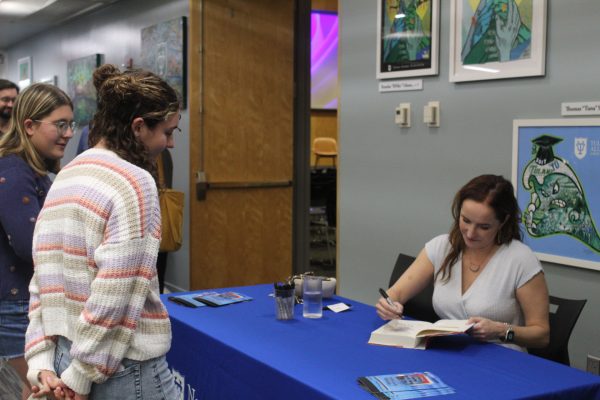
Rebecca Makkai, author of this year’s The New York Times bestseller “I Have Some Questions for You,” and novels “The Great Believers,” “The Hundred-Year House,” “The Borrower” and the short story collection “Music for Wartime,” spoke on Nov. 6 to Tulane University students and staff.
Each year since 1985, the Zale-Kimmerling Writer-in-Residence Program has brought a distinguished female-identifying writer to campus. This year, the program chose to bring in Makkai.
Makkai’s “The Great Believers” was a finalist for the Pulitzer Prize and the National Book Award. It also received the American Library Association Andrew Carnegie Medal and the Los Angeles Times Book Prize, among other honors.
“I Have Some Questions For You,” released on Feb. 21, is a feminist boarding school mystery that centers around a film professor and podcaster, Bodie Kane, who grapples with a difficult past that she struggles to forget. When Kane is invited to teach a two-week course at The Granby School in New Hampshire — her alma mater — her life takes an unexpected turn.
Kane finds herself inexplicably drawn to a murder case, dating back to 1995, in which her classmate, Thalia Keith, was murdered. As Kane dives deeper into the murder case, and the possible wrongful conviction that followed, she wonders if she may have knowledge of her own that could help her solve the case. Kane’s journey takes her on a path of self-discovery and investigation, blurring the lines between her past and present.
“I knew the plot really before I knew who Bodie was. There’s this seemingly inherent need to reverse engineer the character who is going to be the most vulnerable to circumstances and susceptible to change,” Makkai said.
The narrator of “I Have Some Questions For You,” Kane, is a successful film professor and podcaster in Los Angeles. Her new life in L.A. contrasts deeply with the four miserable years she spent at The Granby School. Makkai details how Kane explores her tucked-away past and becomes aware of the ways in which she has changed over time.
“When she steps back onto this campus, she’s pulled between those two poles. As she slips back into the person she was, she was really shocked to see that she was [no longer] that same person,” Makkai said.
Though some readers may deem Kane an unreliable narrator, Makkai said Kane is simply truthful about her fleeting memories of The Granby School, not purposely unreliable.
“I think she’s being really honest. One of the things [that] she is honest about is the failures of her memory,” Makkai said.
Makkai argues that, despite having only her graduation date in common with her main character, it’s still relatable to see how Kane comes to recognize her own transition into adulthood.
“I think this is the book that I needed to write in my mid-40s,” Makkai said. “I still feel young, but not that young. I need to start making sense of this.”
Part of the story revolves around the conviction of the man who allegedly murdered Keith. Before he was convicted, Omar was an athletic trainer at The Granby School. While Omar initially admitted to the murder, skeptics questioned the legitimacy of the conviction, and some even wondered whether it might have been driven by racial bias.
“Think about the pressure and power that a school like that could wield over local police, state police, etc. [by] just wanting to get it solved,” Makkai said. “Omar is someone who has a very marginal role. He’s not a student, he’s not faculty, he’s the athletic trainer.”
English professor Zachary Lazar commented on the oddity of the true-crime genre.
“It’s always been striking to me how … a staple of our entertainment is murder,” Lazar said.
Makkai said the true crime genre is “evolutionary” because it extends beyond entertainment, prompting readers to contemplate how the story’s elements can be applied to real-life situations.
“What do I need to learn from this? Should I fix it? What do I need to learn from others’ survival?” Makkai said. “I think especially when women are consuming stories of true crime victims, there’s a lot of like, ‘I could find myself in a similar situation’.”
Makkai teased that she already has another novel in the works, which will be set in 1938. Her following book will take place in the present day.



Leave a Comment